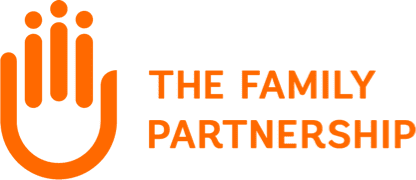As a parent or caregiver, you do everything you can to support your child’s well-being. But even when you’re doing your absolute best, it’s easy to wonder: Am I doing enough to build the kind of relationship that truly supports my child’s mental health? The good news is that small, intentional moments of connection have a lasting impact—and therapists have practical, research-backed tips to help you strengthen that bond.
We spoke with therapists Dana Barnaal, Outpatient Mental Health, and Rosemary Frazel, School Linked Mental Health, from The Family Partnership about the importance of parent-child bonding and what caregivers can do to strengthen their relationships with their children.
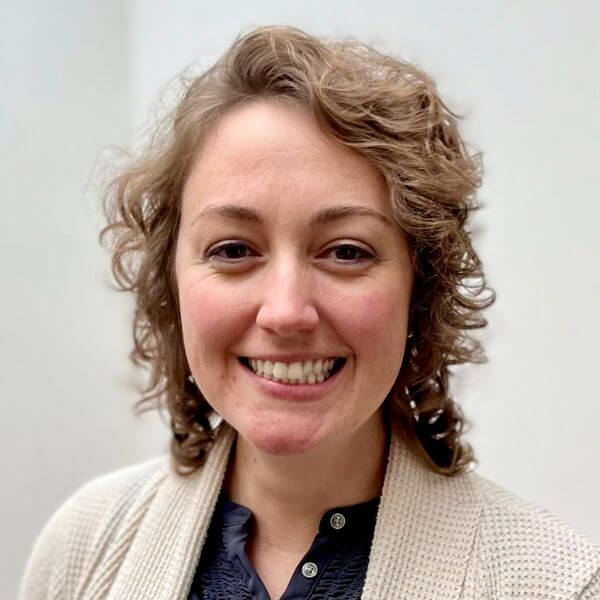

What Makes Parent-Child Relationships So Powerful?
The parent-child relationship lays the foundation of a child’s emotional, social, and cognitive development. When children feel connected to a trusted adult, they’re more likely to thrive.
Strong parent-child relationships help children:
- Build resilience against adversity
- Regulate emotions and behaviors
- Develop a secure sense of self and confidence
- Form healthy future relationships
As Rosemary explains, “Young children are deeply connected to their caregivers. That is why it’s important to focus on and strengthen that relationship.” Dana adds, “Children grow in the context of their relationships.”
10 Therapist-Recommended Tips to Strengthen the Parent-Child Relationship
Based on their expertise as therapists, Dana and Rosemary offer practical ways you can deepen your connection with your child.
1. Normalize Mistakes and Practice Repair
No parent is perfect—and that’s okay. Mistakes are a natural part of parenting. As Dana explains, “Mistakes are going to happen. The important piece is repair.”
For example, Rosemary suggests, “If you’ve made a mistake, apologize to your child. You’re teaching them that mistakes are part of life, and we can always try again.”
When you apologize after a moment of frustration, you show your child that relationships can be mended—and that they are loved, even when things don’t go perfectly.
2. Understand the Meaning Behind Your Child’s Behavior
“Children’s behavior has meaning,” says Rosemary. Slowing down to reflect on what’s underneath the behavior can help build empathy and connection. For example, you may become frustrated with a child who is clingy and having difficulty separating from you during preschool drop-off.
Your first reaction might be to feel embarrassed or frustrated—but if you pause to reflect, you might recognize that their big emotions are a sign of anxiety about separation or a change in routine.
Instead of sneaking out or rushing out the door, you might offer a reassuring hug and affirm, “It’s hard to say goodbye sometimes, but I’ll be back after snack time—just like always.” That calm and connected response helps your child feel safe—and it teaches them how to handle tough feelings over time.
3. Help Your Child Name and Manage Big Feelings
Dana says, “It is important to help children name hard feelings and reassure them that they can handle them.” That does not mean that the child has to handle them alone, however. Dana adds, “We want children to know that their caregiver is there to help them.”
Dana’s advice is in line with recommendations from Zero to Three: Emotions can be overwhelming for children and naming them normalizes them. Helping your child identify and name their emotions is also essential to a child’s social and emotional development.
For example, if your child sits down on the floor and yells “No!” when you ask them to clean up their toys, you can respond by saying, “You don’t want to clean up because you were having fun—it’s hard to stop when you’re not ready.” By calmly naming the feeling and showing you understand, you help your child feel heard while also guiding them toward emotional regulation.
4. Make Time for One-on-One Connection
Dana says, “You don’t need to have a whole day. Just a little time in the morning or evening.” She suggests that just a few focused minutes can make a big difference. This might be 15 minutes in the morning, 15 minutes after school, and 15 minutes in the evening.
You can read a book together, color, or even have them help match socks while you are folding laundry. Rosemary adds, “If you give your child some undivided attention, you will find that you can then back off and they’ll feel ready to play on their own.” This is because the child’s need for closeness and security has been met, and they feel confident in exploring their environment on their own.
5. Celebrate What Makes Your Child Unique
Kids develop a stronger sense of self when caregivers reflect back to them what makes them unique. “Instead of just saying ‘Good job,’ point out something specific,” says Rosemary. “Like, ‘You worked hard on that puzzle. You didn’t give up.’” This boosts a child’s confidence and self-awareness. Rosemary adds, “See your child, notice their capacity, and say it out loud.”
6. Let Your Child Make Choices
Find times when you can let your child have choice, control, and power in a situation. Oftentimes, parents and caregivers tell children what to do all day and that structure is important. However, even small choices help kids feel respected and build decision-making skills.
“Even something like choosing what color they want to wear or choosing between a couple items for dinner helps them feel empowered,” says Dana. This supports autonomy and builds confidence.
7. Reframe “No” as Growth
Rosemary suggests that parents and caregivers celebrate “No!” rather than seeing it as a power struggle. A child’s repeated use of the word is powerful because they are beginning to recognize themself as an individual and asserting themself. It is an important part of child development.
One way to do this would be to pause and take a couple of deep breaths to calm yourself. Then, you could reframe a command as a choice like, “Do you want to clean up by yourself or do you want us to clean up together?”
8. Support Unstructured Play
“Play is how children process the world,” says Dana. It’s also how they learn. Harvard Center on the Developing Child states that play supports executive function and social-emotional development. “Play is how young children learn and heal,” says Rosemary, “Play is a balm.” Also, play provides opportunities for connection between children and their parents and caregivers.
For example, when you are present in the room while your child plays, say aloud what you notice about their play. If the child invites you to join by giving you one of their dolls, for example, you could follow their lead.
9. Offer Reassurance During Tough Times
Children often blame themselves when conflict arises or something goes wrong. Rosemary urges parents to consider this and turn down the intensity of their reactions to when children act out. This might mean taking deep breaths to calm yourself or stepping away if it is safe to do so.
Also, during especially tough situations like divorce or stress at home, Rosemary suggests parents let their children know, “You didn’t do anything wrong. This is a grown-up problem.”
10. Take Care of Yourself, Too
“The biggest predictor of a child’s mental health is the mental health of their caregiver,” Dana says. Self-care isn’t selfish—it’s necessary.
Rosemary uses the Healthy Mind Platter to help parents and caregivers understand their needs and how to balance those with responsibilities. The Healthy Mind Platter offers several types of activities that support your mental health:
- Focus time
- Play time
- Connecting time
- Physical time
- Time in
- Downtime
- Sleep time
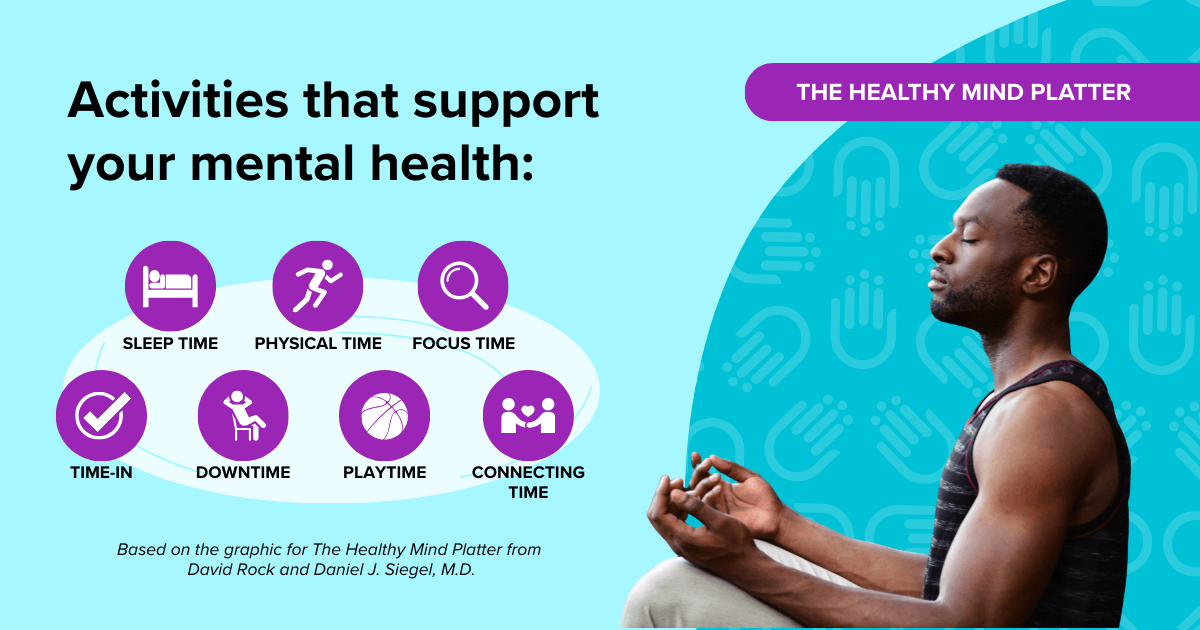
If don’t have time for these, try to change your schedule, set boundaries, and/or find support.
Both Dana and Rosemary emphasize the need for parents to seek support.
Some of those options might be:
- Find an Early Childhood Family Education program
- Reach out to a social worker at your child’s school
- Seek support through religious organizations
- Turn to trusted individuals and support people
- Search for local parenting groups and/or online communities
- Find a therapist at TFP or through Psychology Today’s directory
Rosemary also says, “If you’re parenting alone, show yourself a lot of grace and kindness.” Parenting is very difficult to do without support, so, connect with the supportive people in your life or find other sources of support.
A Two-Generation Approach to Family Healing
At The Family Partnership, therapists like Dana and Rosemary use a two-generation (2Gen) approach—helping parents and children heal together. If a child is struggling, often the best first step is offering support to the parent as well.
“When we give parents the tools to reflect and repair,” says Rosemary, “they create stronger bonds and more stability for their children.”
Want to help support Minneapolis parents and caregivers?
Consider a donation to The Family Partnership’s Rise and Shine Campaign. By midnight on 5/11, Mother’s Day, your gift will help provide essential support for mothers and other caregivers through The Family Partnership’s 2gen programs.
Sarah Williams joined The Family Partnership as the new Development Manager in March. We sat down with Sarah to talk about her experience, community engagement, and her priorities in the coming year.
Tell us a little about your background—what drew you to nonprofit work and eventually to The Family Partnership?
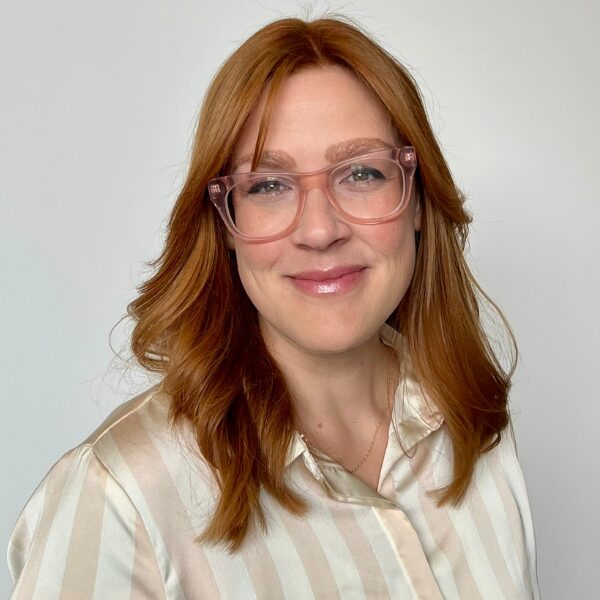
I have a background as a special education teacher, a legal advocate in child protection, and as a fundraiser for youth and family shelters. In all those roles, I have seen how systems that are meant to serve children and families often fail to meet their needs. The systems themselves are difficult to navigate and may cause additional harm to families already experiencing trauma caused by racial and economic inequity.
My experience as a legal advocate in child protection left a deep and lasting impression on me. I watched caregivers work tirelessly to meet the requirements of rigorous case plans with little resources or support. I wondered to myself, who is here to help the parents, as they work to meet the needs of their children? That’s why I’m so excited to work for The Family Partnership where caregivers can get that support through our Family Home Visiting programs and Mental Health Therapies.
In my time at People Serving People, I learned how early childhood education is a vital piece of housing stability for families. When families have quality childcare, caregivers can rest easy knowing that their child is safe while they are at work or pursuing an education. The income parents earn helps secure a safe and stable home for their children. Early childhood education is a once-in-a-lifetime opportunity to set children up for success far into the future. Four Directions, TFP’s multicultural and therapeutic preschool, provides screenings, checkups, and therapies to ensure that children are growing and thriving at this pivotal time in their lives.
How has your experience in communications and community engagement shaped your approach to development work?
My previous marketing experience showed me the importance of awareness and visibility in building a following. That experience shaped my approach to fundraising because I emphasize the “one to many” fundraising approach where you are speaking to a larger audience, whether that’s through digital communications, mailed correspondence, or in-person gatherings. You never know who might connect with your mission, so you share message broadly. Awareness is the first step in the journey. Once you get that first response, whether it’s a reaction to a social media post or an event invitation, you can deepen that relationship.
What are your top priorities in your first year as Development Manager?
I want to get to know the existing community that supports The Family Partnership. That means connecting to program staff, board members, and donors. Once I do that, I will strategize and work towards strengthening and expanding that community. TFP has a strong traditional fundraising approach that is based on philanthropic relationships. I am excited to learn about that while also doing broader outreach to possible new donors.
You’ve mentioned a focus on growing our donor base and engaging a new generation of donors. What is your vision for that work?
I truly believe in the power of the many. When we all come together, bringing whatever we have to offer, we’re unstoppable. Everyone has different gifts and talents. One person may give financial support; another may spread the word; another may volunteer their time. In terms of fundraising, I see how every single gift adds up. Every gift, of any size, contributes to the end goal and makes a difference. So, I’m excited to bring my marketing experience to help spread the word about TFP and to add to the already incredible base of TFP advocates.
Why is it important that our donor and volunteer communities reflect the families we serve?
When donors or volunteers can see themselves in the families we serve, they feel a stronger connection to our mission. All volunteer work and fundraising must center the dignity of families and that becomes easier and more natural when donors, volunteers, and families have shared lived experiences.
What role do events and community storytelling play in your development strategy?
In-person gatherings and storytelling are both important ways to build connection and a sense of shared humanity. Consequently, both are key to growing support for a mission. I believe in the power of strength-based storytelling to center the human experience behind our programs. I want to tell participant stories that evoke positive emotions and reactions, stories of their successes that supporters can connect to. Doing that during events is also powerful because those positive feelings are contagious.
If you’d like to learn how you can support TFP through a gift of time or money, you can find more information on ways to give here.
We’d like to introduce you to Robert Pickering, Chief Financial Officer, who joined The Family Partnership in March. We asked Robert to share his background and his thoughts on what he hopes to accomplish at The Family Partnership.
Tell us about your background and what brought you to The Family Partnership.
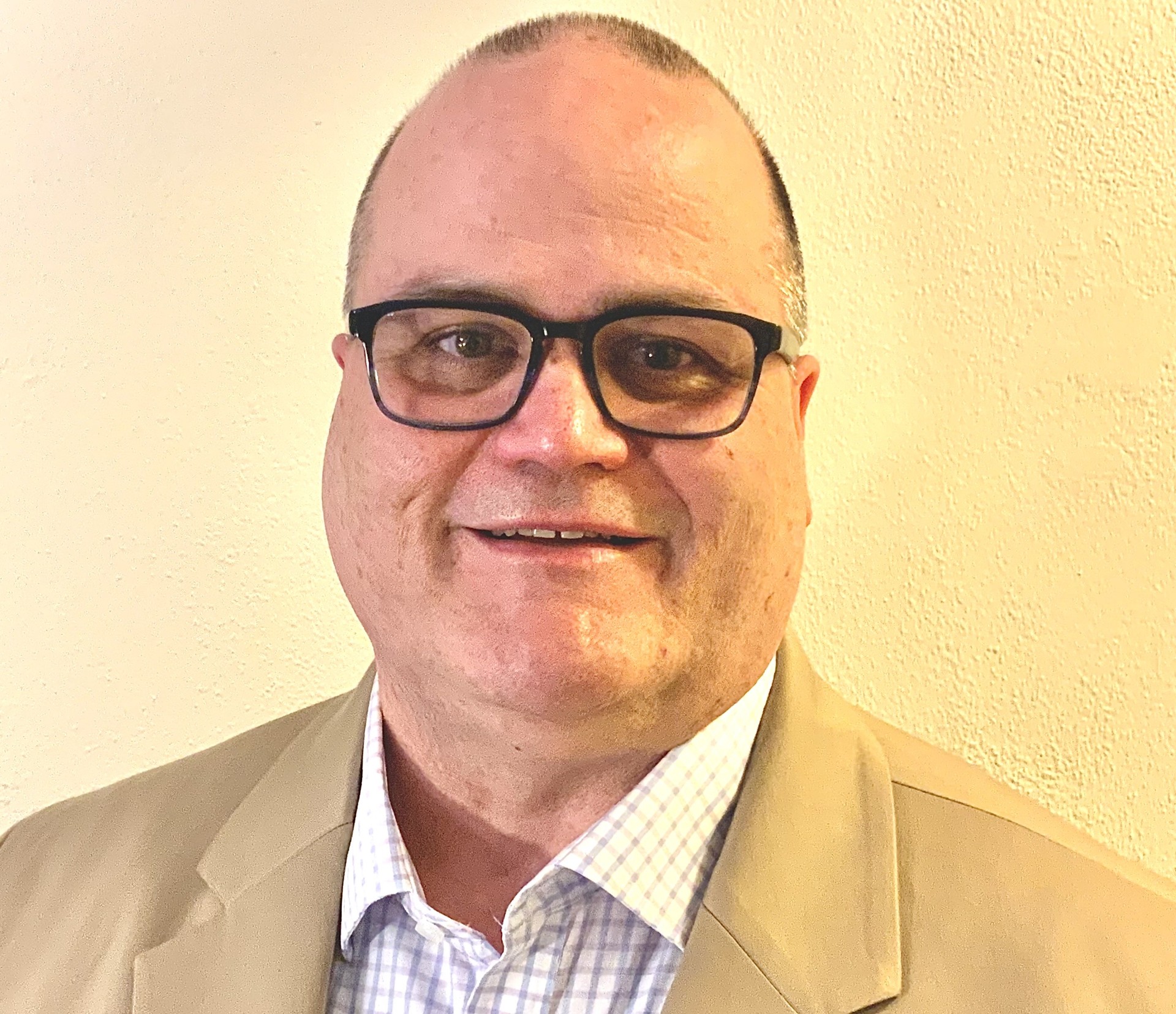
I have always been drawn to mission-based organizations and have worked in the nonprofit and social services sector my entire career. Most recently, I spent eight and a half years as the CFO at Accord, a nonprofit that supports people with disabilities, where I oversaw finance, IT, and facilities.
Prior to that, I was the Vice President of Finance and Administration at Lifetrack Resources, a Minnesota nonprofit that later became part of Lutheran Social Services. That’s actually where I first learned about The Family Partnership (TFP). Lifetrack also had a therapeutic preschool, and during that time, I had the chance to meet John Everett Till, TFP’s Chief Strategy Officer. He shared information about how best to create opportunities and positive outcomes for children in early childhood education programs.
Is there a personal experience or value that guides your approach to financial leadership in the nonprofit sector?
My path began with Community Action of Ramsey and Washington Counties in the early 1990s with the Head Start program. The Clinton Administration doubled the Head Start funding and I was charged with managing the budget, as well as finding classroom space and managing transportation, and food services.
Working with young children—many of whom were navigating difficult life circumstances—helped me see how early childhood programs like Head Start could offer equitable access to quality education. That sense of equity and fairness still guides my work today.
What excites you most about joining TFP at this moment in time?
The staff and leadership have been very welcoming. TFP has a rich history and strong reputation in the community, and I am looking forward to a new opportunity and challenge. We are creating systems and processes that will help the organization build financial resilience, make the best use of our resources, and help guide sound business decisions.
TFP is prioritizing financial stability in our bridge strategic framework. What would you say to funders, partners, and community members about the organization’s path forward?
We’re focused on being accountable and transparent with the resources entrusted to us. Our goal is to make smart decisions that maximize the impact of every dollar. I appreciate that TFP is located on Lake Street, rooted right in the heart of the community we serve. Our path forward includes continuing our community-centered programming. I also want to continue to figure out ways to support our early childhood programs.
Looking ahead, what are your top priorities for your first months/through the end of the year as CFO?
My primary focus is ensuring TFP remains financially sustainable to continue to serve the community for at least another 147 years. My goal is to help program managers meet their budget goals while creating the strongest impact they can.
Anything else to add?
I sit on the board of directors of Nonprofit Insurance Trust which provides liability and worker’s comp to nonprofit organizations. TFP is a member of that trust. I also sit on the finance committee for Emma North Services and on the executive committee for the Minnesota Multifaith Network.
I believe in and am committed to giving back to the community, both through my career and my volunteer work.
As we establish the financial foundation for our next chapter—we invite you to be part of it! Whether you’ve donated, volunteered, or just believe in our mission, your support clears the path for family success in Minneapolis. Sign up for our newsletter to stay informed and get involved.
Give by midnight on May 11, Mother’s Day, to support mothers and caregivers through The Family Partnership’s 2Gen programs. Like the daisy, which turns toward the sun to grow and thrive, mothers shine brightest when supported by a strong community. Rise and Shine is a campaign to uplift and honor mothers who work every day to create brighter futures for their children.
Reaching Towards the Sun: Amber’s Story

My name is Amber. I am a mother of six, a full-time student, an intern, and the steady force in my children’s lives. Raising six children under ten—especially with some of them having developmental delays—requires faith and a lot of patience. My oldest has autism, and my five-year-old twins are being evaluated for a spectrum diagnosis. Each of my children has unique needs, and it takes a lot of effort to support them and find resources to help them thrive.
I’ve always been strong, and I’ve always had the potential to succeed. But without the right support, I struggled for years to grow under the weight of it all. Then, one day, while I was pregnant with my sixth child, trying to help my other kids through their dysregulation and big emotions, I realized I couldn’t do this alone. I owed it to myself and my children to seek support and that’s how I met Morgan at The Family Partnership about a year ago. She understood the growth I wanted and helped me take root and begin to rise.
I owed it to myself and my children to seek support and that’s how I met Morgan at The Family Partnership about a year ago. She understood the growth I wanted and helped me take root and begin to rise.
Amber, Mother and Participant in TFP’s 2Gen Programs

Since then, I’ve grown tremendously. I learned how to meet my children’s emotions with calm instead of stress. When one of my kids is overwhelmed, I have enough emotional capacity to hold them close and sing to them. I’ve also connected my twins to occupational therapy and work with a therapist myself—because I know that taking care of my own well-being makes me an even better mother.
I also found something just as important: a community of mothers at The Family Partnership who uplift and support one another. I’ve learned valuable parenting strategies and built friendships with other moms who are now part of my support system. With all of this good support at TFP, I’ve done more than grown—I’ve truly flourished.
With all of this good support at The Family Partnership, I’ve done more than grown—I’ve truly flourished.
And finally, after years of living in a small apartment, my family is moving into a five-bedroom house. My children will have the space to play, to grow, and to just be kids. I’m creating a sensory room to support their needs and make our home a place of peace and healing.
I’ve faced challenges, but I will never stop reaching towards the sun. I am building a future where my children have everything they need to shine.
Donate Today and Send a Daisy Seed Packet to Honor a Mother in Your Life

Your gift to Rise and Shine helps provides essential support for mothers and other caregivers through The Family Partnership’s 2Gen programs.
At TFP, parent educators like Morgan work with families to understand their needs and share resources that help each member of the family thrive. We also coordinate parenting groups to help mothers build a reliable, long-term support systems that they can lean on.
Will you help more moms like Amber access the resources they need to help their family bloom?
Remember: the deadline to give is midnight on May 11th, Mother’s Day!
In appreciation, you can honor a mother in your life with a special daisy seed packet—a cheerful reminder of the care, strength, and support that helps families flourish. Daisy seed packets are available with donations to Rise and Shine only until April 25th.
At The Family Partnership, we believe in generational healing and wellbeing—and this starts with experienced and strategic leadership. We are excited to announce that we have launched a search for our next President & CEO, in partnership with CohenTaylor Executive Search Services.
The President & CEO will be responsible for advancing The Family Partnership’s mission and vision while providing strategic leadership across the organization’s operations, including administration, finance, and programs. As the primary representative of TFP, this leader will cultivate and strengthen meaningful partnerships with key stakeholders to drive impact and innovation.
The ideal candidate will be a dynamic and relationship-centered leader with a track record of guiding complex teams and fostering a strong organizational culture. Experience in health and human services—particularly in behavioral health, early childhood, youth, and family support—is highly valued.
Location: Minneapolis, MN
Salary Range: $172,000 to $180,000.
Learn more about the position and apply here:
About The Family Partnership
For more than 147 years, TFP has successfully partnered with families and individuals to remove barriers and clear the path to success for those who have experienced deep poverty and trauma. We strive to be a leader in closing opportunity and achievement gaps for children and families living in poverty by providing high-impact, multicultural services, building powerful partnerships, and changing public policy.
Our holistic services and offerings include:
- Early Childhood Education and Care
- Mental Health Therapies
- Family Home Visiting
- Anti-Sex Trafficking
- EGG Toolkit
TFP’s use of a comprehensive multi-gen approach based on our established two-generation (2Gen) framework puts us at the forefront of breaking intergenerational cycles of poverty, adversity, and trauma. This whole family approach to our services promotes child and family health and well-being across generations to increase economic security, educational success, and overall healthy development.
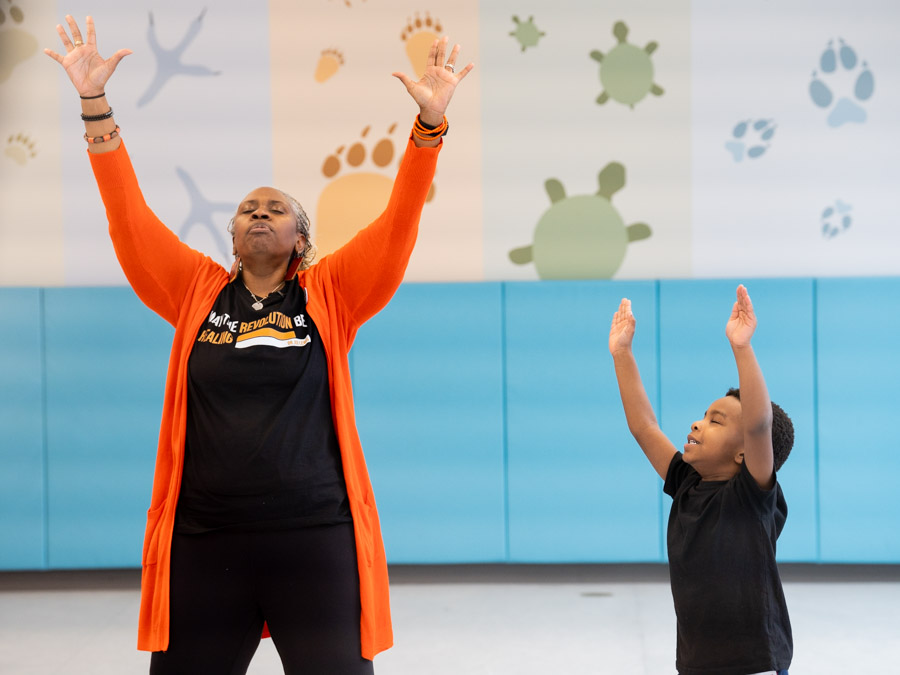
executive function and self-regulation skills at the stage when brain development is at its fastest and most foundational.
Key milestones from 2024 include:
- 100% of children graduating from Four Directions Preschool tested at or above the age-adjusted national median for executive functioning, the overall best predictor of success in school and life. This number includes 51% of children who utilized onsite developmental therapies
- 100% of parents and caregivers enrolled in Parenting for the Future, one of our family home visiting programs, improved their knowledge of childcare and parenting skills
- 94% of clients in outpatient mental health services made progress as determined by their treatment plans
- 85% of clients in our anti-sex trafficking program maintained or increased safety
- Preschool teachers using EGG Toolkit, The Family Partnership’s early childhood executive function curriculum, saw a statistically significant improvement in child behavior after one school year
Minnesota’s recent investments in early childhood have helped thousands of Minneapolis families living in or near poverty achieve significant milestones through The Family Partnership’s programs in 2024:
- 90% of children in our preschools graduated kindergarten-ready, nearly doubling the 52% rate of their peers
- 87% of children in developmental therapies met their treatment goals
Parents like Amanda Youlou have directly benefitted from these investments. She used and early learning scholarship to enroll her daughter, Lilah, at TFP’s top-rated Four Directions Preschool. Through play-based learning, healthy nutrition and nurturing care from her teachers, Lilah thrived. She also accessed onsite play-based therapy to help her cope with the death of her father.
“Lilah developed a love of learning at Four Directions,” shares Amanda. Today, Lilah is thriving in second grade, and Amanda credits The Family Partnership with helping her daughter build the confidence and emotional resilience she needed to succeed.
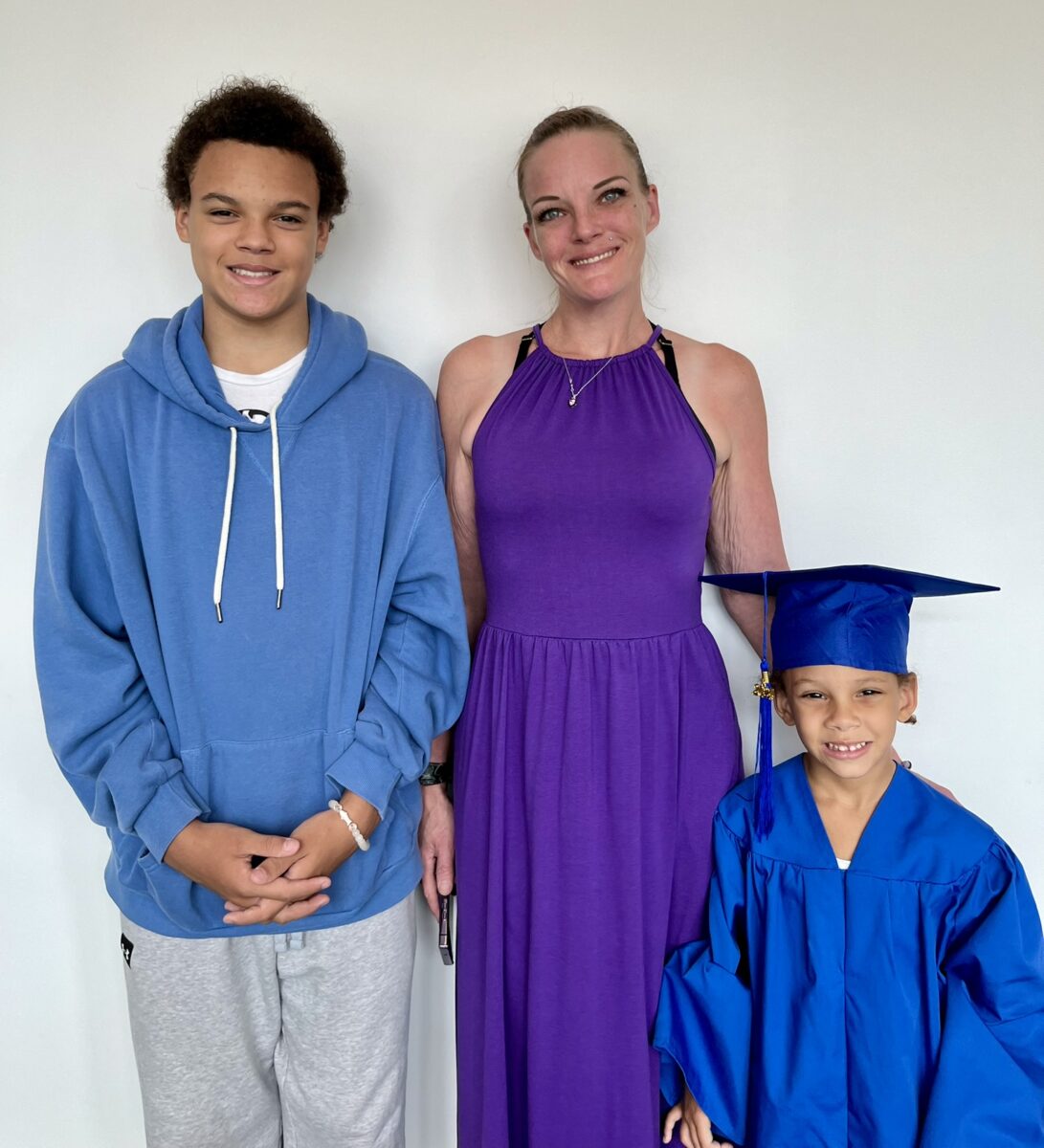
Research shows that children like Lilah who receive high-quality early childhood education experience positive outcomes in cognitive development. This is especially true for executive function skills that predict children’s academic achievements in K-12 education and, later, success in the workforce.
Early Childhood Investments in 2023 Fuel Minnesota’s Economy and Families, Highlighting the Need for Increased Funding in 2025
High-quality early childhood programs like Four Directions make it possible for parents and caregivers to participate fully in the workforce. “Without good childcare, you can’t get to work,” Amanda explained, “or you might have leave your kids with people you don’t know well.”
Without good childcare, you can’t get to work or you might have to leave your kids with people you don’t know well.
Amanda Youlou, parent
Workforce participation and affordable child care go hand in hand, especially for low-income families who otherwise spend an average of 36% of their income on child care. Studies show when child care costs are subsidized, parents and caregivers from low-income households are much likelier to remain employed, especially in full-time jobs.
In 2023 the Minnesota Legislature made historic investments in our state’s families and future by investing $1.3 billion over four years to early childhood education and care—one of the boldest commitments in the nation. These funds expanded access to high-quality child care and early learning programs, with key actions including:
- More funding to help families afford preschool and high-quality child care through Early Learning Scholarships (ELS)
- Expanded access to the Child Care Assistance Program (CCAP) that helps cover child care costs for more families
- Simplified application process to make it easier for families to qualify for financial support
- Increased payments to child care providers so they can keep offering quality care for families
While these steps made a difference, they do not fully address the needs of thousands of working families still struggling to find affordable, high-quality child care. Legislators from both sides of the aisle, including Rep. Nolan West (R-Blaine) and Rep. Carlie Kotyza-Witthuhn (DFL-Eden Prairie), are currently proposing legislation to expand Early Learning Scholarships to more families in need.
Child Care Shortages Cost Minnesota Families and the Economy Billions Each Year
It is important to sustain early childhood investments in 2025 including early learning scholarships. The demand for affordable, high-quality child care is rising as more workers return to the office. At the same time, every region in Minnesota is grappling with significant child care shortages that limit families’ options.
In 2024, first Children’s Finance estimated these shortages affected 89,528 Minnesotan children with working parents. Without better options, many parents stay home or reduce their work to part-time in order to care for their children. Some parents alternate working hours with their partners or other family members, missing out on important family bonding time.
The cost of insufficient child care in Minnesota affects families as well as businesses and taxpayers. Research shows these negative impacts total $2.1 billion in losses per year in Minnesota including:
- $19,610 average loss for parents in earnings and productivity each year
- $3,280 loss in revenue for businesses, per working parent
- $5,170 loss for taxpayers due to lower income tax and sales revenue, per working parent
These monetary losses have long-term consequences for children, especially those living in low-income households. Economic instability increases risks that children will experience hunger, homelessness or child maltreatment. In fact, poverty has the same harmful impacts as other Adverse Childhood Experiences (ACEs) like physical abuse or neglect. There are lifelong ramifications for children who grow up with toxic stress related to economic instability, including higher risks of depression, substance abuse and unemployment in adulthood.
Early childhood investments are some of the most strategic moves Minnesota can make for our short-term and long-term prosperity.
Early childhood investments are some of the most strategic moves Minnesota can make for our short-term and long-term prosperity. We’ll support this generation’s working parents while building a strong workforce for the next. These investments will continue to position Minnesota as one of the nation’s best places to raise a family and strengthen our economic growth.
Take Action: Advocate for Expanded Early Childhood Funding in 2025
Join The Family Partnership in raising awareness and support for early childhood investments. Here are just a few ways you can help:
- Join The Family Partnership this Thursday, 2/20/25 for Advocacy for Children Day at the capitol and make your voice heard
- Contact your legislators and encourage them to support funding (HF 470/SF 1049) for early childhood education.
- Sign up for our newsletter to stay informed about our advocacy efforts
The Family Partnership is working with the Minnesota Department of Revenue to make sure individuals and families who qualify for new tax credits can access free tax preparation.
Even if you do not have to file a Minnesota income tax return, you can still file to get tax benefits. There are five new Minnesota tax credits you may be able to claim that may help you pay less taxes and get a bigger refund. Let a professional preparer help you claim what you’re eligible for!
Who is Eligible for Free Tax Preparation?
Generally, you can get free help preparing your taxes if:
- You are age 60 or older
- You are a person with a disability
- You speak limited or no English
- Your annual income is less than $67,000
If any of the above statements are true for you, visit the Minnesota Department of Revenue to search for a free Tax Preparation Site. The sooner you find a tax preparation site, the better. Spaces can fill up weeks before Tax Day on April 15, 2025.
How Do I Find a Free Tax Preparation Site?
You can use the Minnesota Department of Revenue’s free tax preparation site tool to find sites.
- You can search by zip code or county
- You can use the Language menu to find sites with help in Spanish, Hmong, Somali, or other languages
All sites only prepare basic returns. Learn more about the services offered at free tax preparation sites by visiting this IRS webpage.
What Do I Need to Provide?
You should bring a picture ID and other personal information to your appointment.
- A government-issued photo ID
- Social Security cards or Individual Tax Identification Numbers for all listed on the tax return
- Birthdates for all listed on the tax return
You should also bring records showing income you received, tax-deductible expenses, and property tax or rental payments you made.
To learn more details about which records to bring, visit the Minnesota Department of Revenue.

Where Do I Learn about Minnesota’s Newest Tax Credits?
You can learn more about the following tax credits on our Minnesota Tax Credits page:
- Minnesota Child Tax Credit
- Working Family Credit
- K-12 Education Credits
- Property Tax Refunds for Homeowners
- Property Tax Refunds for Renters
You can also reach out to the Minnesota Department of Revenue for more information and help:
Minnesota Department of Revenue
Phone: 651-296-3781 or 1-800-652-9094
Website: Minnesota Department of Revenue
This service made available through a grant provided by the state of Minnesota.
The Family Partnership (TFP) is excited to welcome Julie Bluhm as our new Interim President & CEO. Julie brings expertise in guiding nonprofit organizations through transitions and aligning mission-driven work with sound business practices. Her leadership will guide TFP through the search for a permanent CEO and help us to continue building a strong foundation for the future.
Julie shared her enthusiasm and vision for her work with TFP:
“My goal during this interim period is to help connect the dots between The Family Partnership’s strengths and align this organization for the best outcomes. By the time TFP’s new leader arrives, we will be ready for the next chapter, and staff will feel rested, calm, fulfilled and excited about the future.”
My goal during this interim period is to help connect the dots between The Family Partnership’s strengths and align this organization for the best outcomes.
Julie Bluhm, Interim President & CEO
Introducing our Bridge Strategic Framework
In tandem with this leadership transition, TFP’s Board of Directors has adopted a Bridge Strategic Framework for 2025-2026. This forward-looking plan outlines five priority areas to guide TFP’s mission of building strong families, vital communities, and brighter futures for children.

Financial Sustainability
TFP is committed to ensuring its 146-year legacy of serving families and children experiencing intergenerational trauma, poverty, and adversity. Through flexible funding strategies, new revenue streams, innovative partnerships, and operational efficiencies, TFP will remain resilient and impactful amid an evolving financial landscape.
Organizational Health and Resilience
Recognizing the critical role of staff and board members in sustaining its mission, TFP will prioritize enhancing internal systems, supporting staff well-being, and strengthening board governance to navigate change with creativity and flexibility.
Intergenerational Impact through Services
Using a two-generation (2Gen) approach, TFP will continue to break cycles of poverty, adversity, and trauma by integrating services for both children and caregivers. Grounded in evidence-based practices, this approach addresses systemic racism and other barriers to create sustainable outcomes for families.
Thought and Practice Leadership
TFP remains committed to service delivery innovation and collaboration with local and national partners to drive improved outcomes for children and families.
Equity, Inclusion, and Anti-Racism
Dedicated to equity and inclusion, TFP will apply best practices in anti-racism within its operations and services while fostering leadership development across its staff and board.
Interim Leadership Builds a Strong Foundation for our Future
The Bridge Strategic Framework complements Julie Bluhm’s interim leadership by providing a clear and actionable roadmap for advancing TFP’s mission. Julie’s leadership philosophy is deeply rooted in helping organizations thrive during times of change:
“I’m really passionate about helping organizations connect their strengths and prepare for new leadership. If we do this well, we can ensure that the next leader’s skills, interests, and passions align perfectly with TFP’s needs.”
Julie’s prior experience includes serving as CEO of Guild Services, where she succeeded the organization’s founder. This experience gave her unique insights into the complexities of leadership transitions, inspiring her to help organize a support group for executive directors navigating similar journeys.
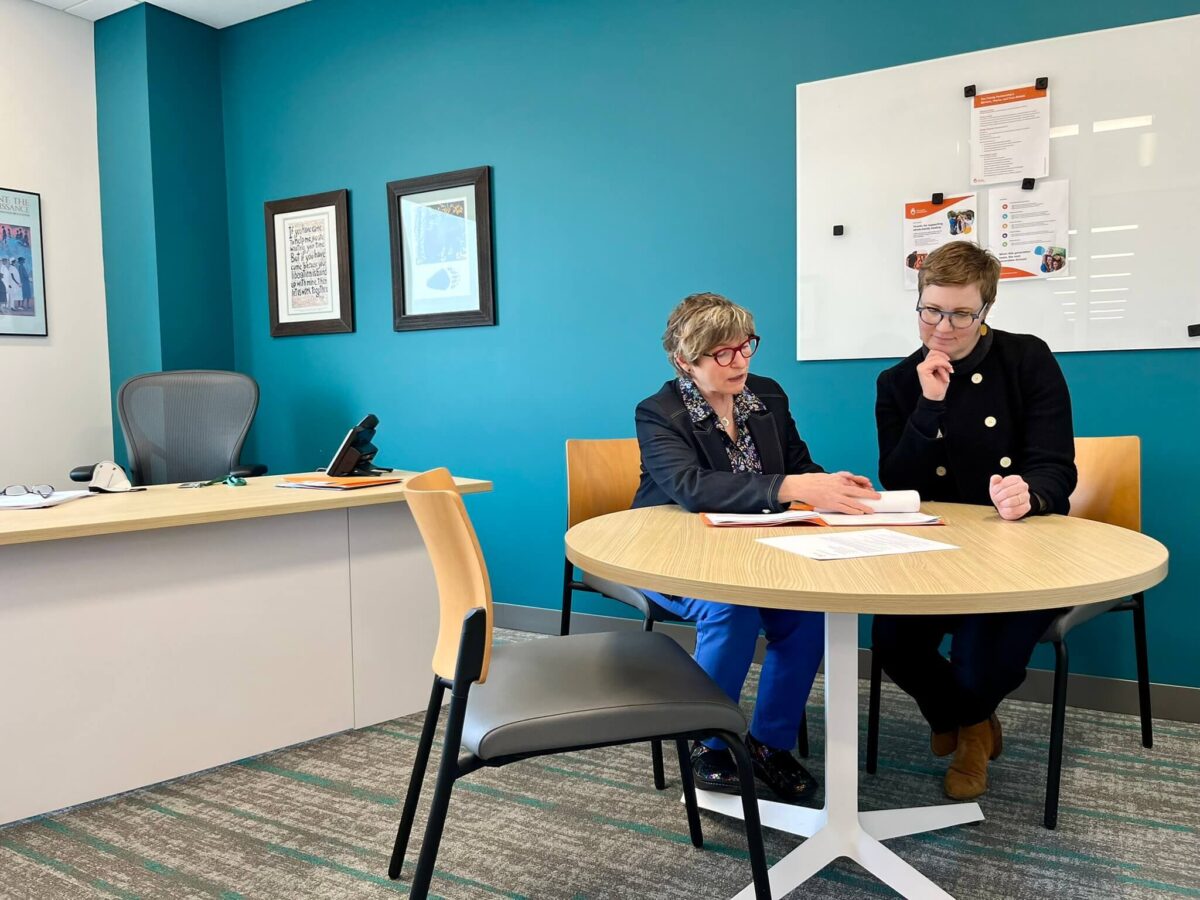
“The decision to hire Julie was made with great care and optimism for TFP’s future,” said Kit Briem, outgoing Interim President & CEO. “Julie’s leadership will provide the time and stability we need to thoughtfully select a permanent CEO who will steer TFP for years to come.”
As TFP searches for a permanent CEO, the organization is confident that Julie’s thoughtful, mission-driven approach—combined with the Bridge Strategic Framework—will position us for continued success in working to clear the path to success for children and families in Minneapolis.
Thank you for supporting generational healing in Minneapolis this year. Whether you participated in programs or donated, whether you volunteered or advocated, you are helping this generation to heal so the next generation thrives.
As Bayo Akomolafe writes, “The times are urgent: let’s slow down.” We hope this seasonal care package invites you to slow down and find moments of connection and purpose amidst the busyness of the season.
Together, we can nurture healing and hope for ourselves and future generations.
Strong Families
As part of our 2gen approach, we believe strong families form the foundation of strong communities—advancing generational healing at household and community levels.
- Make a paper window star
- Listen to a Read Along of Winter’s Gifts by Kaitlin B. Curtice, Potawatomi Nation
- Color a holiday page for Wintertime, Kwanzaa, Hanukkah, or Christmas
- Bake a winter treat: Polvorones de Canele, Sufganiyot, or Sweet Potato Pie
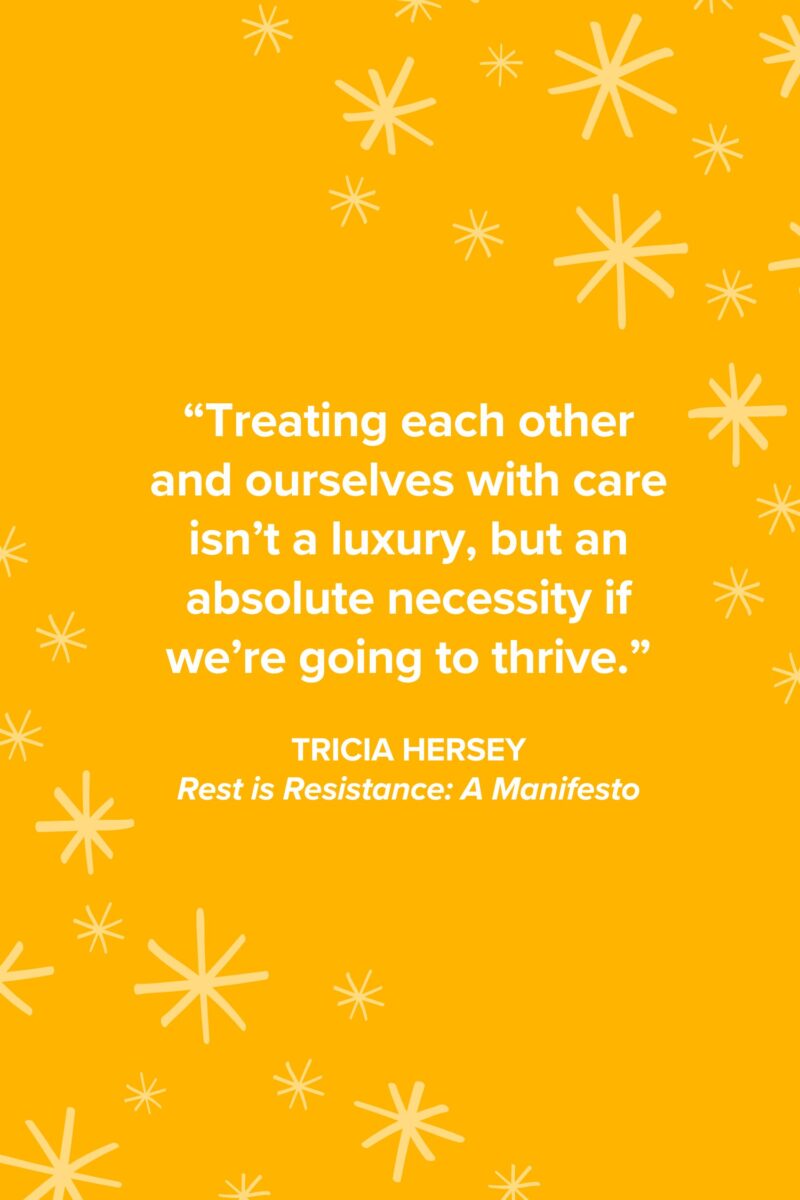
Tricia Hersey, Rest is Resistance: A Manifesto
The times are urgent. Let’s slow down.
Bayo Akomolafe
Vital Communities
Our 146-year legacy of generational healing in Minneapolis includes building partnerships that build community resources and strength.
- Listen to live jazz at Midtown Global Market on December 21 with Wenzo Ashby and guest vocalist “Tiahna”
- Visit Walker Art Center for free during First Free Saturdays
- Plan a visit to the Art Shanties from January 18 to February 9, 2025 at Bdé Umáŋ / Lake Harriet
- Attend an event at Black Youth Healing Arts Center from Irreducible Grace Foundation
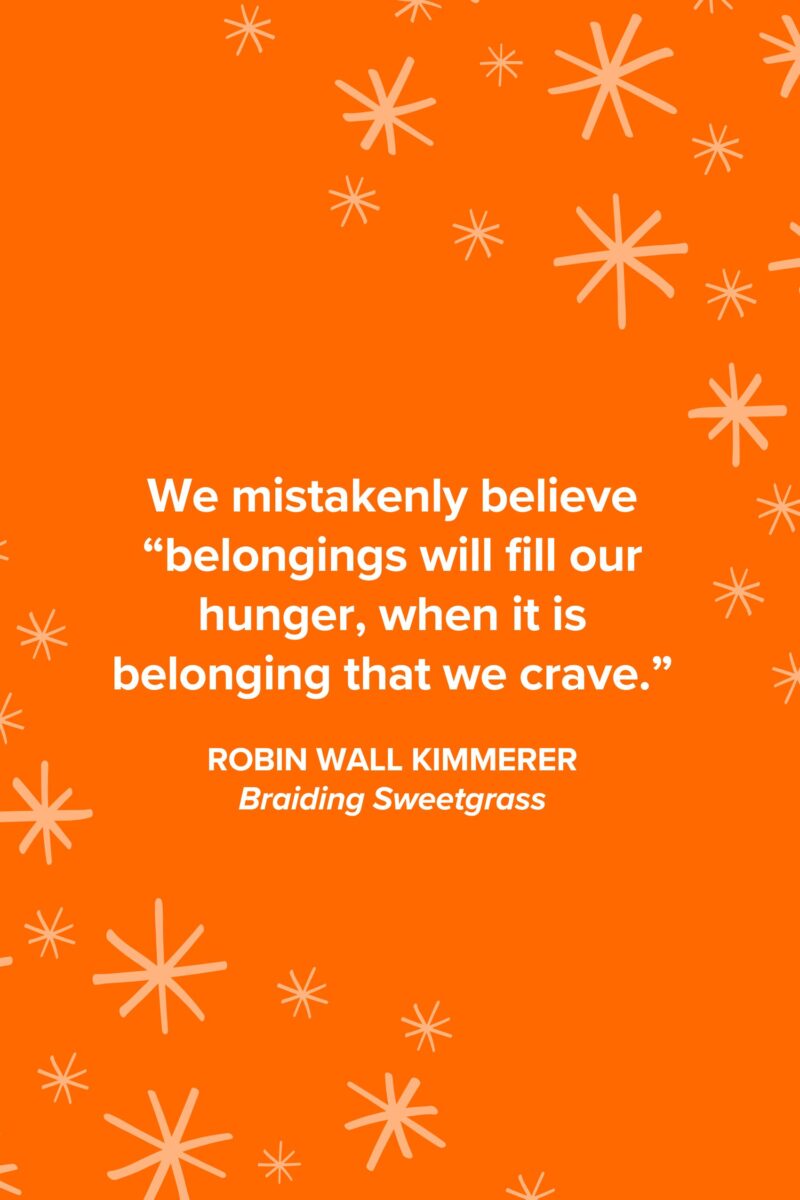
Robin Wall Kimmerer, Braiding Sweetgrass
Better Futures for Children
Strong families and vital communities support a world in which all children, regardless of income or origin, have the opportunity to thrive.
- Belly breathe together with Elmo from Sesame Street, Common, and Colbie Caillat
- Set New Years resolutions for family wellbeing using this guide from Gottman Institute
- Volunteer as a family with The Family Partnership or another organization
- Advocate for affordable childcare in Minnesota using this guide from Think Small
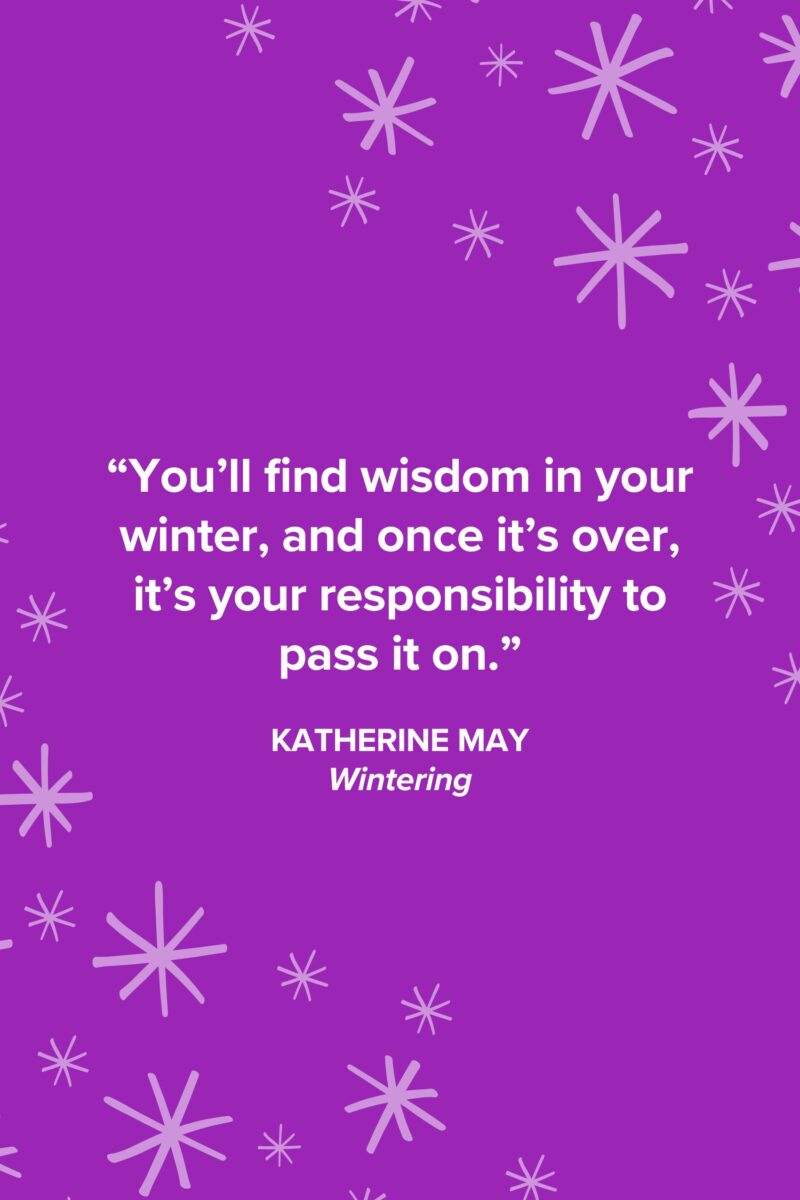
Katherine May, Wintering
Thank you for supporting generational healing in Minneapolis this year.
The Family Partnership Team
